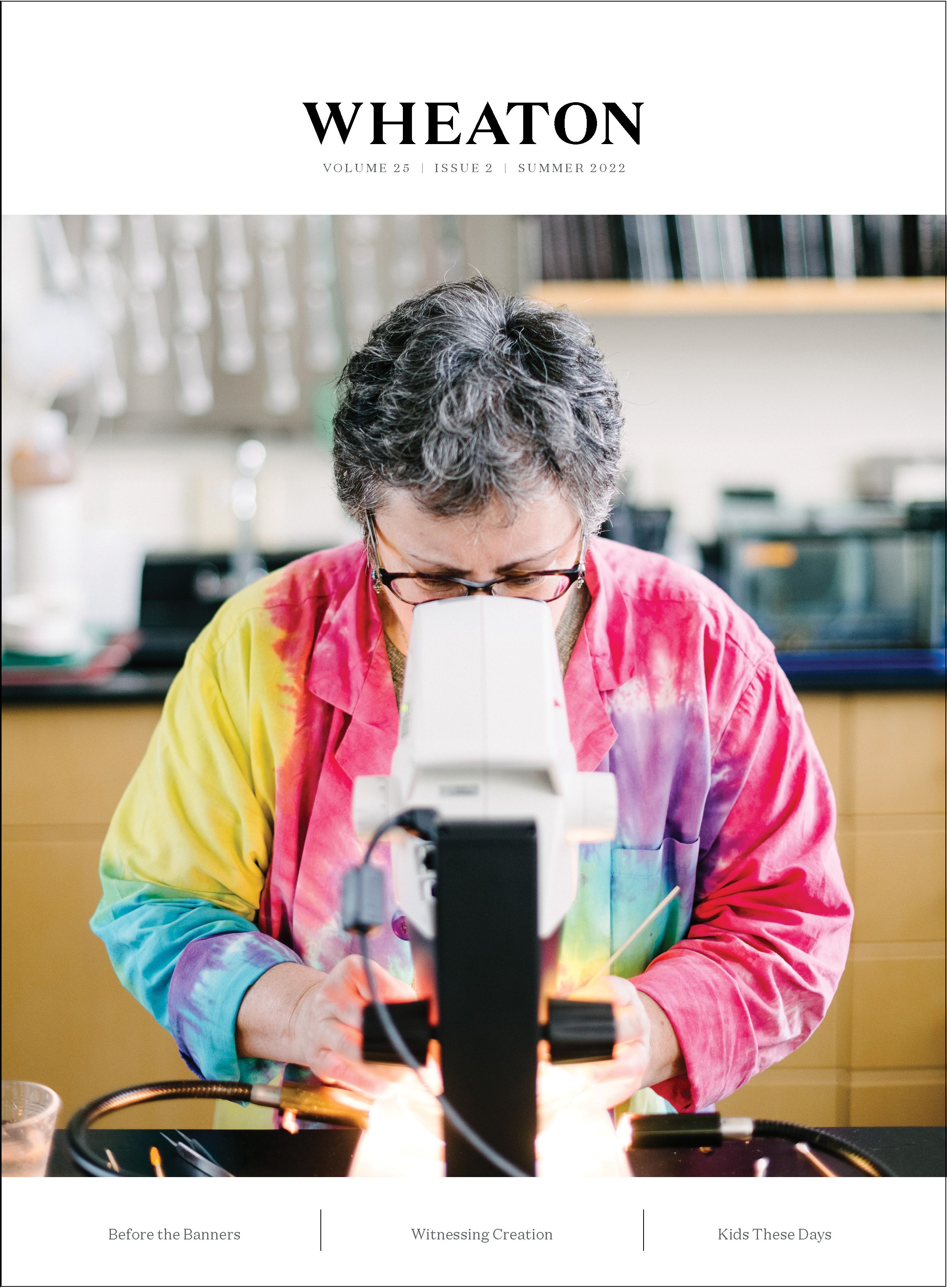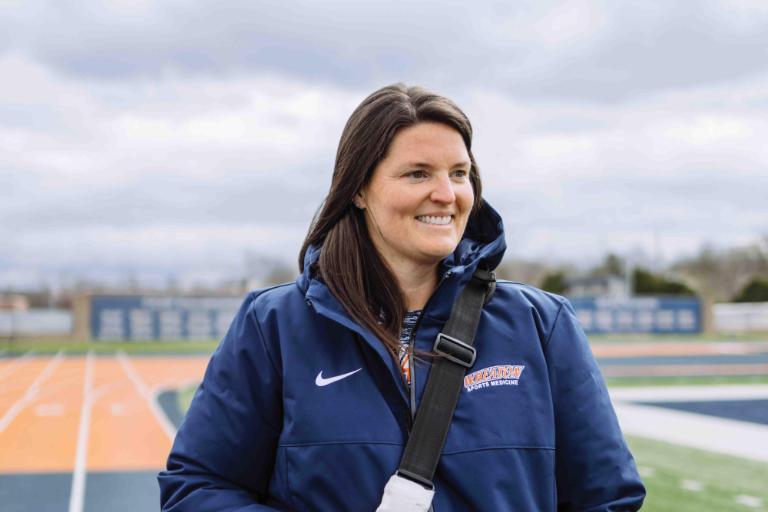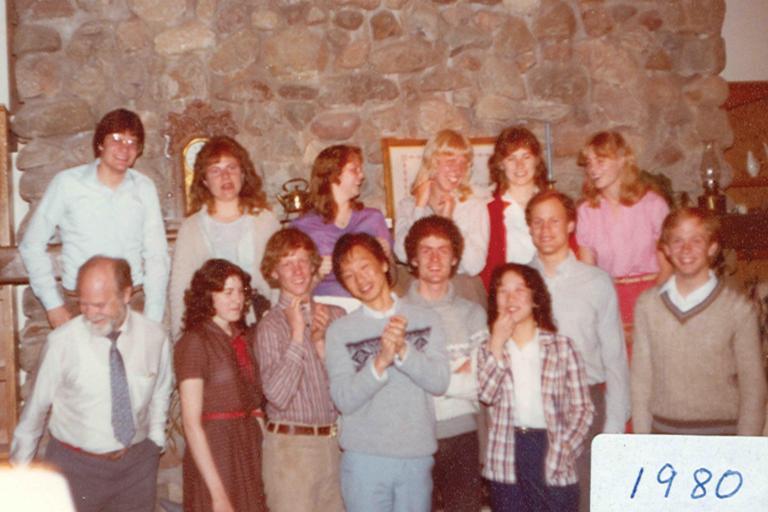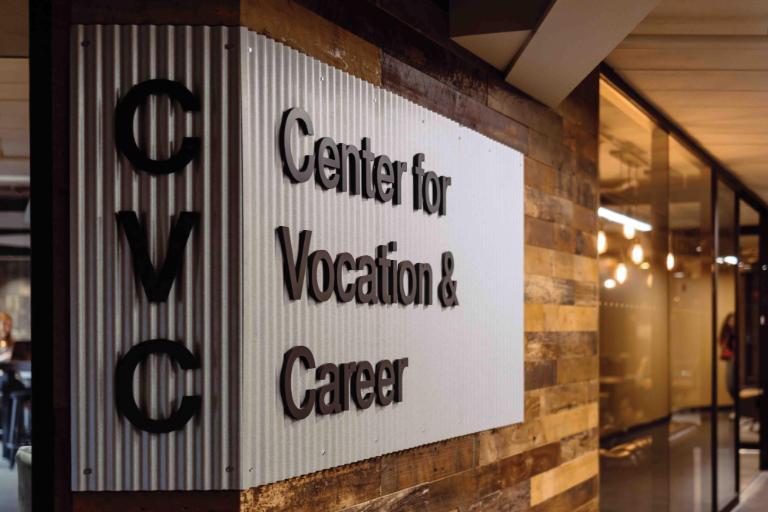Before the Banners
The History and Legacy of Wheaton Women’s Athletics
Words: Abby Dorman ’17
Photos: Tower Yearbooks
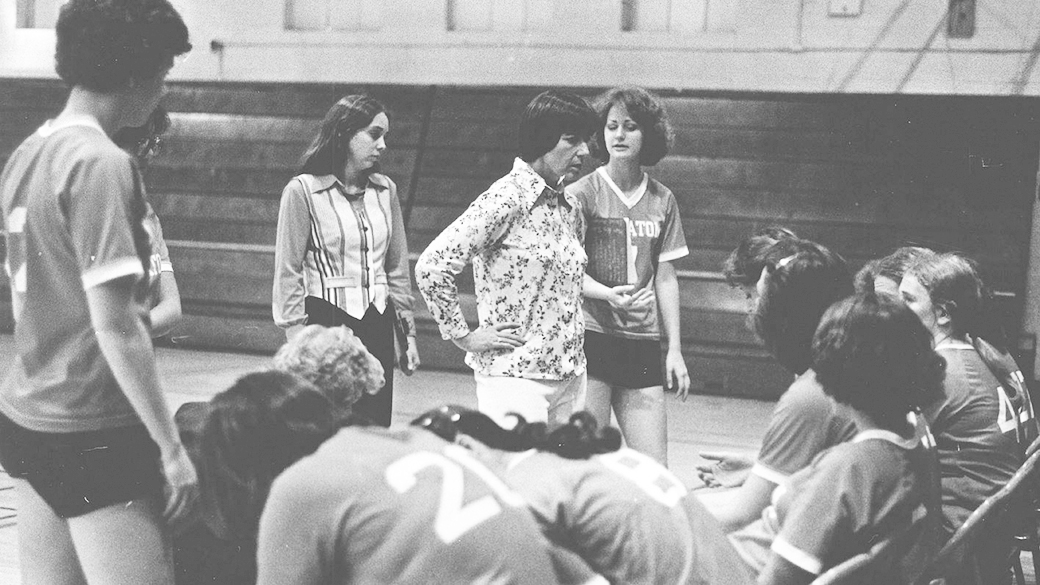
Coach Marilyn Scribner offers some words of wisdom to the volleyball team
Blue and orange banners adorn the gym walls and stadiums at Wheaton College, commemorating the hard work and accomplishments of athletic teams from years gone by. The frames in All-American Hall highlight snapshots of greatness, celebrating athletes who excelled in their sports throughout Wheaton’s history. Today, Wheaton women’s sports teams and athletes hold a hefty share of these accolades. But before a single banner was hung or picture framed, the founding mothers of Wheaton athletics labored for years in relative anonymity.
THE EARLY YEARS
Marilyn Scribner HON arrived in Wheaton, Illinois, in 1961 after beginning her teaching and coaching career in Washington state. Initially, she refused a job offer from Wheaton’s Athletic Director Harve Chrouser ’34, but Scribner felt the Lord impress Hebrews 11:8 on her heart: “By faith Abraham, when called to go to a place he would later receive as his inheritance, obeyed and went, even though he did not know where he was going” (NIV).1 By faith, Scribner moved to Illinois and stayed there for the remainder of her life.
Before Scribner’s arrival, women’s athletics existed only in physical education classes, intramurals, and student-run clubs. A creative solution called Playdays emerged in the early 1940s, where women from local colleges participated in one day of multisport competition at a host school. The student-led Wheaton Women’s Athletic Association (WAA) sponsored these outings, paid for with club membership dues and profits from bake sales.
Nonetheless, women like Dorothy (Dot) McDonald Chrouser ’34 were instrumental in laying a foundation for generations of Wheaton women athletes, coaches, and staff to come. Chrouser spent her undergraduate years as an active member of the WAA and a joyful competitor in inter-class and inter-literary society basketball, baseball, soccer, and volleyball. When her husband, Harve, served on staff, Chrouser remained faithful in her support of Wheaton Athletics. She was an instructor of physical education and referred to in an admiring 1943 Tower yearbook article as the “number one director of all women’s athletics.”
Chrouser was also passionate about raising up young women to be active, whether in organized sports or other extracurricular activities. From forging strong relationships with athletes and coaches to co-founding the HoneyRock Center for Leadership Development with her husband, Chrouser consistently broke ground for women’s involvement in sports leadership.
By the early 1960s, Marilyn Scribner, Martha Cole Baptista ’45, Ruth Berg Leedy ’32, and others formed a core group that championed extramural women’s sports at Wheaton. The group was undeterred by the initial lack of support for college-sanctioned women’s varsity sports. They took the helm of the inaugural women’s varsity sports teams, coaching field hockey (Leedy), basketball (Baptista), and volleyball and softball (Scribner).
For some of the athletes, competing on an intercollegiate team was their first experience playing on a sports team. Barbara Carlson Burwell ’65, an Illinois native, recalls that team sports were not allowed for young girls state-wide because the competition was deemed “too stressful and emotional.” She joined the Wheaton field hockey and basketball teams as a green but eager freshman, experiencing her own personal growth alongside the women’s athletics department.
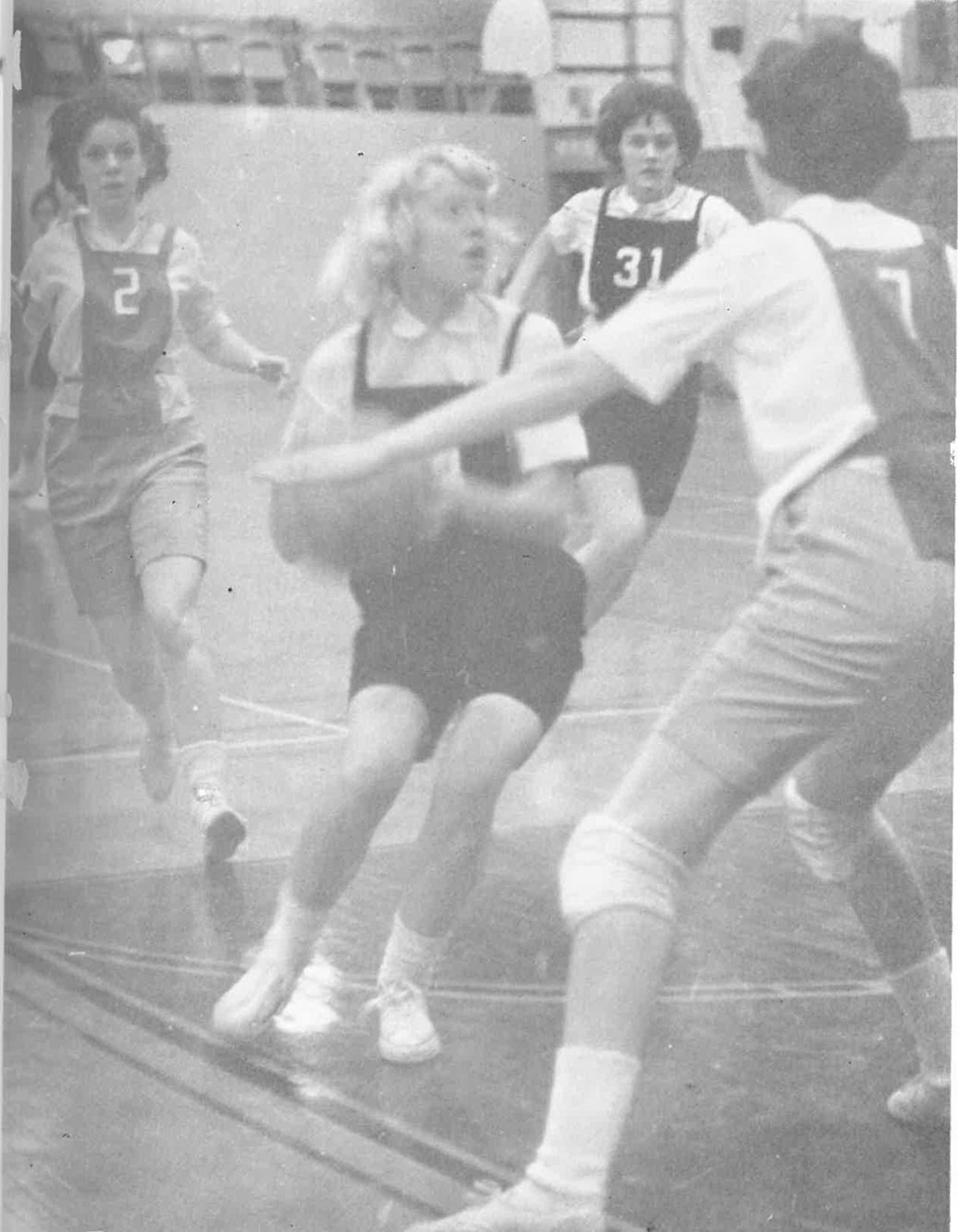
Genelle Samuelson ’65 eyes the hoop.
1964
In the 1960s, women’s basketball nationwide was still a halfcourt sport played with three offensive and defensive players on each end. Burwell, who went on to become a physical education teacher and health sciences professor, was puzzled by the limitations on the women’s game. Looking back, she said, “I could never figure out why they thought we couldn’t run up and down a basketball court even though in field hockey we ran up and down a field of one hundred yards.”
Despite the differences in the game, the 1967–68 women’s basketball team set the bar high. To date, they are still the only team in Wheaton women’s basketball history to achieve an undefeated season. They finished 11–0 with victories over the University of Iowa, Northwestern University, Northern Illinois University, and others.
The perfect season was never documented in the school yearbook, but anyone looking for proof might have found it in the architecture of the old Alumni Gym. Coach Baptista documented the team’s reaction after defeating the University of Iowa. “We were gracious winners and contained our elation within the bounds of courtesy,” she said. “But if a crack is ever found in the Alumni Gym roof, you can be sure that it came from the horrendous noise that resounded throughout the gym when the Iowa bus pulled away!”2
Alumnae from the early era of women’s sports fondly remember the competition and camaraderie, but the influence of their coaches and teammates on their spiritual lives stood out the most. Sue Vogt ’68 was a new Christian when she arrived at Wheaton to play basketball, softball, and tennis. She described Wheaton athletics as “missional,” saying, “It laid a foundation of seeing your life as a platform for sharing Christ. It definitely formed me as a person.”
Other alumnae passed on the lessons learned by becoming coaches themselves. Bea Gorton ’68 became the first-ever head coach for women’s varsity basketball at Indiana University from 1972–76. Carol “Q” McEwing Harding ’68, a five-sport athlete and member of the undefeated women’s basketball team, returned to Wheaton to coach basketball and field hockey from 1974–84. Aside from instilling discipline and excellence in her athletes, she was motivated to convey the same relational care she had received. “My coaches cared about me, and I wanted to continue that,” she said. “I wanted to convince my students that I cared about them.”
THE TITLE IX ERA
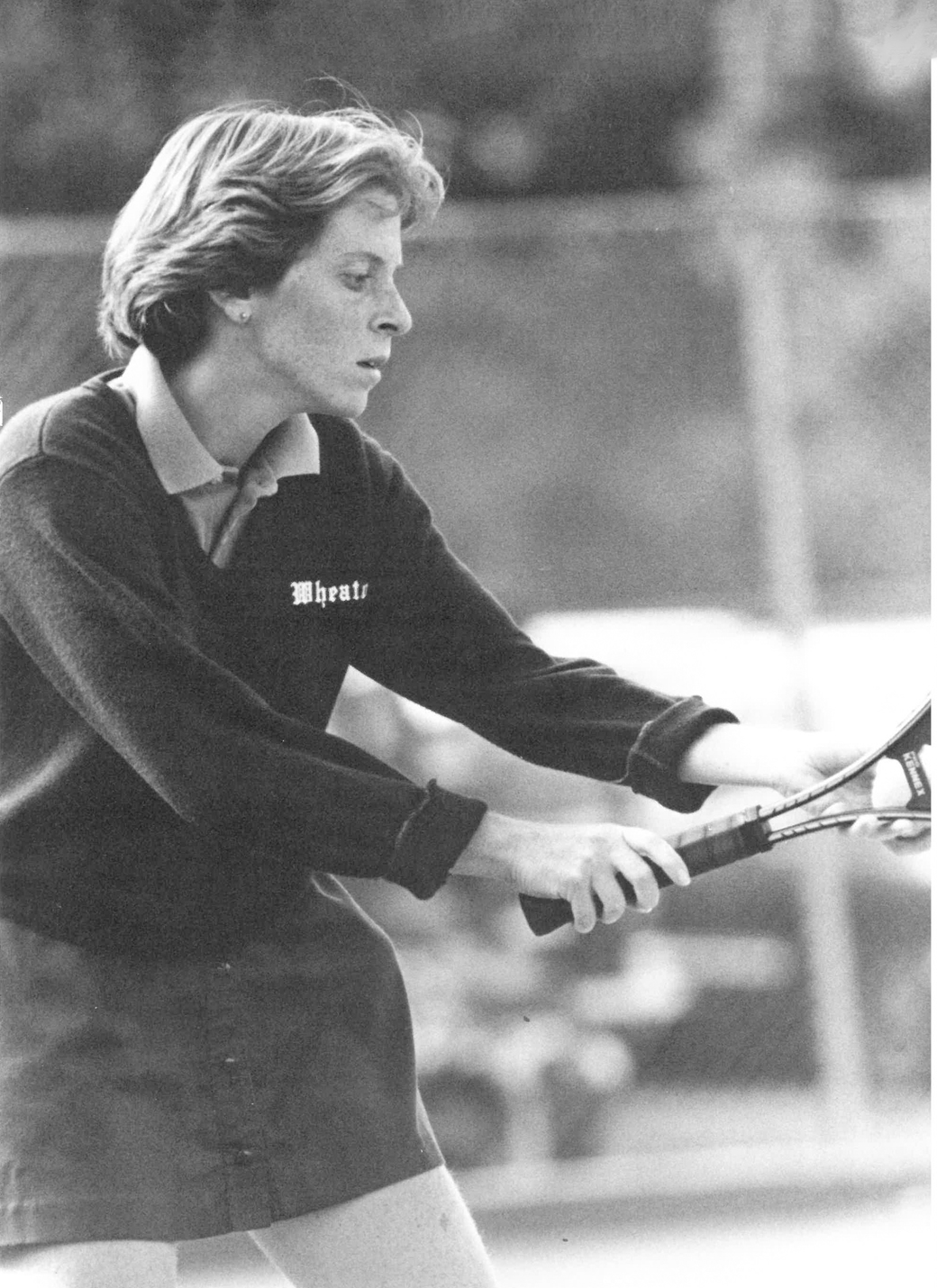
Preparing to serve
1983
Title IX was passed by the U.S. Congress as part of the Education Amendments of 1972. This law prohibited any federally funded educational institutions from discriminating against students based on sex. Today, it is widely remembered as the legal basis for equality in men’s and women’s sports.
For many schools, including Wheaton, Title IX began a much-needed movement toward better funding and facilities for women’s athletics. Gone were the days when women’s coaches paid for team meals out of their own pockets or drove the players to games in their personal vehicles.
Still, larger changes took more time to implement. Coach Harding recalls the time that one of her basketball players, an athlete named Beth McKinney Baker ’77, needed to rehab a shoulder injury. She said, “The women had no weight room available to them because it was in the men’s locker room. So [the athletic trainer] had to meet Beth at six in the morning to take her in to use the weight room to strengthen her shoulder.”
Longtime Wheaton tennis coach Jane Nelson ’83 played basketball and tennis in the same era. She remembers the separate and sparse women’s athletic facilities, including a locker room and training room in the unfinished basement of Coray Gym. In the long winter months, with no indoor track or training facility, she ran the stairs in Fischer Hall to stay in shape.
Despite the disparities, Nelson described how she and other athletes were grateful for the chance to compete. She said, “To us females who were participating, we were just so excited to have the opportunity to play that we weren’t really focusing on [the facilities].”
Nelson certainly made the most of her opportunity. In tennis, she was the AIAW Division III national flight three singles champion and was named AIAW Division III All-American as a freshman. As a junior, she claimed the doubles runner-up title in the NCAA national tournament. In basketball, she still ranks in the top 16 in school history in scoring, free throws, field goal percentage, rebounds, steals, and assists.
Nelson was one of the first among many athletes who paved the way not just for equal participation for female athletes, but also for athletic excellence.
WHEATON FEMALE ATHLETES EXCEL
The College Conference of Illinois and Wisconsin (CCIW) didn’t begin sponsoring women’s sports until 1985. Since then Wheaton women’s teams have amassed 100 conference championships across all sports, more than any other CCIW team.
Coach Nelson and her tennis teams have contributed their fair share of conference titles to Wheaton’s tally. Since Nelson began coaching in 1986, Wheaton women’s tennis has won 22 CCIW regular-season titles and made 12 NCAA postseason appearances.
Wheaton women’s swimming has also procured a long list of team and individual accolades. Kirsten Nitz Brown ’16 completed a stunning 3-event sweep in the 50-yard freestyle, 100-yard butterfly, and 200-yard backstroke at the 2013 NCAA swimming championships, then added two other titles during her career. From 1998–2017, the team won 20 consecutive CCIW championships. In total, the program accounts for 25 of the 100 Wheaton women’s CCIW titles.
Wheaton swimming alumna Katie Deysher Kimmel ’16 was motivated by the conference championship banners she saw every day on the natatorium walls. She said, “It felt like walking into a legacy of people who loved the sport, but also just loved one another.” Not only do the banners serve as a visual reminder of the program’s success, but that even in an individual sport, no swimmer is alone.
Notably, Wheaton women’s soccer won three NCAA national championship titles in 2004, 2006, and 2007 and finished as runners-up in 2008 and 2011. Taryne Lee Russo ’10, who still holds the record for goals scored in a season, arrived on campus two years after Wheaton’s first national championship and found a culture of excellence already in place. “The culture of Wheaton women’s soccer was known to have women who loved the Lord, but also competed at the highest level,” she said. “The program, coaches, and the girls on the team would hold one another to that level.”
Assistant women’s soccer coach Sarah Guidera ’15 found the same culture in place when she played several years later. She returned to coach at her alma mater with an equal passion for team culture and high-level competition. “I’ve always wanted to give back to the program and serve our players in hopes that they’ll walk away with experiences like I had,” she stated. “And I still need to win that national title.”
Regardless of the sport, former Athletics Director Julie Schmela Davis ’91 believes that the sustained success of Wheaton women’s athletics over time elevates support for female athletes as a whole. Perhaps most importantly, she believes that Wheaton athletes’ all-around experience is just as important as their success on the court or field. She said, “We want all of our student athletes to have a really good competitive experience and grow in their knowledge and ability in their sport, do well in the classroom, and grow in Christian discipleship.”
ENDURING LEGACY
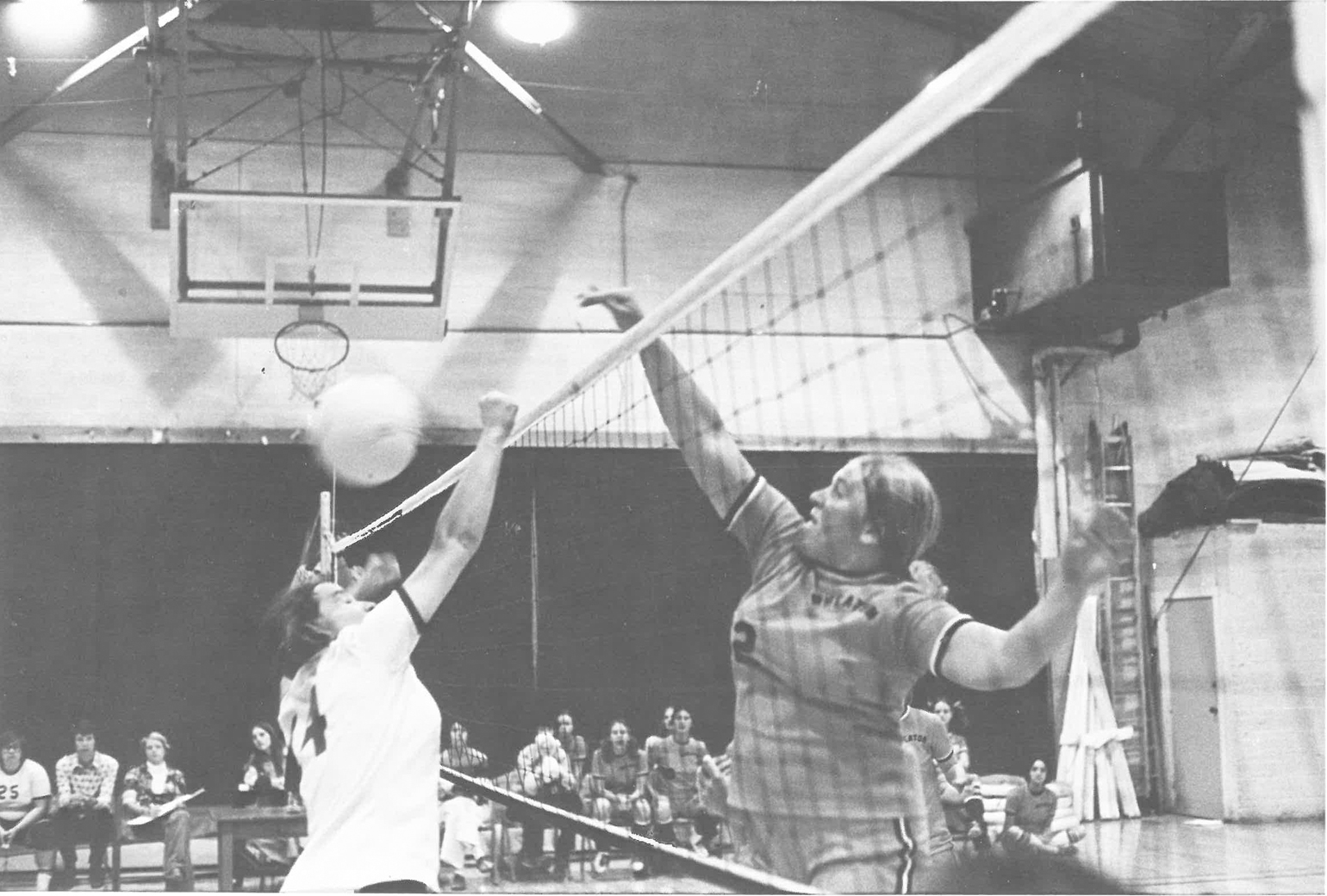
Betty Welsh ’79 spikes the ball
1977
Volleyball coach Stephanie Schmidt joined the Wheaton Athletics Department in the spring of 2017 with a desire to coach and disciple young athletes. Once her first season was underway, Davis introduced Schmidt to Marilyn Scribner, Wheaton’s first ever volleyball coach. The more alumni Schmidt encountered, the more she understood the breadth of Scribner’s influence on Wheaton women’s athletics.
Scribner herself estimated that she worked with some 4,000 students over her 50 years of teaching and coaching at Wheaton.3 Her pupils and players graduated and went on to serve as missionaries, run businesses, and raise families. Still others were so strongly influenced by their time under her mentorship that they returned to Wheaton as the next generation of coaches and teachers.
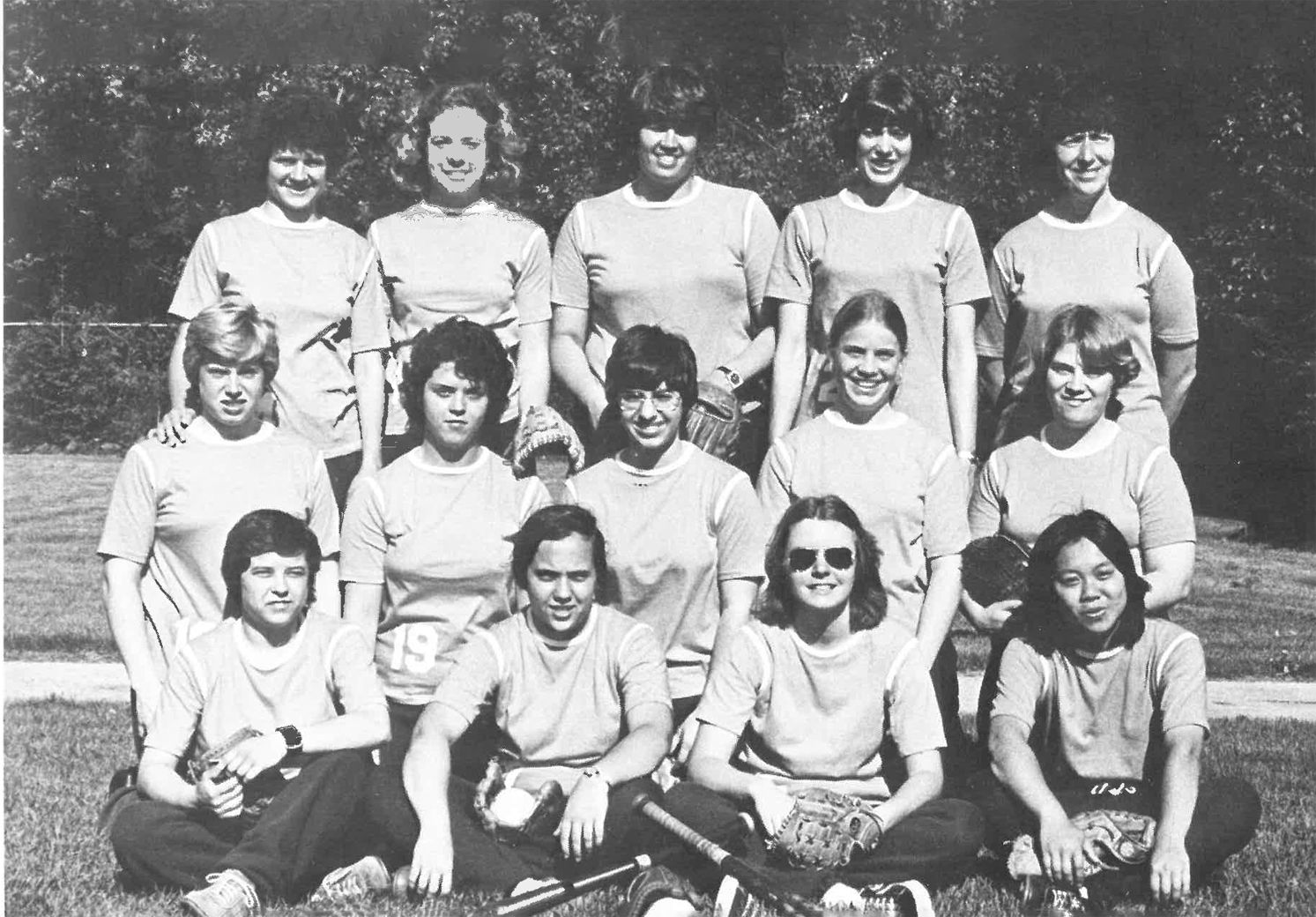
Wheaton Women’s Softball Team
1977
Penny Polson ’80 spent four years as an assistant coach under Scribner after playing volleyball and softball as a student. Penny fondly remembers how Marilyn was not ashamed when sharing her faith with her players and their opponents. Once, Marilyn prompted Wheaton players to socialize with the opposing team after a match and sing the “Wheaton College volleyball theme song”: “I am persuaded to believe . . . tho the devil hate us he can never separate us from the wonderful love of God.”
Looking back, one can draw a direct line in the genealogy of Wheaton women’s sports from founding coaches like Baptista and Scribner. Carol McEwing Harding ’68 played under both women and went on to coach athletes in the era of Beth McKinney Baker ’77 and Jane Nelson ’83. Baker retired in 2011 after 25 years at the helm of Wheaton women’s basketball, while Nelson still carries the torch into year 36 of coaching women’s tennis.
As a newer coach, Schmidt quickly acknowledges her gratitude for the decades of persistence and grit that earlier coaches displayed to allow Wheaton women to enjoy high-level competition and athletic facilities today. Most importantly though, she embraces the spiritual example set by her predecessor. “I think [Marilyn Scribner] set a great example for what it looked like to be a woman who loved the Lord and had no apologies about being strong, athletic, and competitive,” Schmidt said. “It’s an honor to acknowledge that and to keep recreating a team that reflects those same ideals.”
As today’s athletes don the blue and orange, they represent more than just the institution of Wheaton College—they carry on the legacy of generations of women who displayed deep love for others and enjoyment of sport for the glory of Christ and his kingdom.
“It is obvious that sports for women at Wheaton combined skill, travel, competition, and—for most athletes—great fellowship. One hopes that the future varsity teams will not lose the best parts of all: Christian fellowship and witness.”4
—Martha Cole Baptista ’45
1 “No Peace without Obedience,” Marilyn Scribner, Wheaton magazine, Spring 2002.
2 Through Clouds and Sunshine, “Section II - Women’s Athletics,” Martha Baptista, p. 262, 1983.
3 “No Peace without Obedience,” Marilyn Scribner, Wheaton magazine, Spring 2002.
4 Through Clouds and Sunshine, “Section II - Women’s Athletics,” Martha Baptista, p. 266, 1983.
